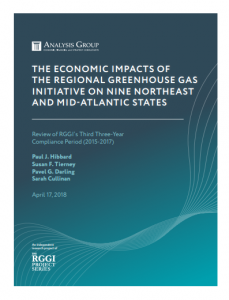Full Title: THE ECONOMIC IMPACTS OF THE REGIONAL GREENHOUSE GAS INITIATIVE ON NINE NORTHEAST AND MID-ATLANTIC STATES
Author(s): Paul J. Hibbard, Susan F. Tierney, Pavel G. Darling, Sarah Cullinan
Publisher(s): Analysis Group
Publication Date: April 1, 2018
Full Text: Download Resource
Description (excerpt):
In 2009, ten Northeastern and Mid-Atlantic states launched the Regional Greenhouse Gas Initiative
(“RGGI”), the country’s first market-based program to reduce emissions of carbon dioxide (“CO2”)
from existing and new power plants.
The scope of RGGI is significant: the current set of RGGI
states account for more than one-eighth of the population in the U.S. and more than one-seventh of
the nation’s gross domestic product. It is thus important to evaluate and understand the program’s
performance and outcomes. Through their development and implementation of the RGGI program,
these states have gained first-mover policy experience and have collaborated to form a multi-state
emission-control policy that has reduced CO2 emissions from the power sector and operated
seamlessly with well-functioning and reliable electricity markets.
Recently, other states have expressed interest in implementing carbon-control programs that are
similar in structure to RGGI’s approach. One option for those states would be for active collaboration
to allow for trading of CO2 allowances among affected sources in these states and the current RGGI
states.
Insights and observations gleaned from an analysis of RGGI’s performance could thus be
valuable not only to the RGGI states as they consider future policy recommendations but also to other
states and regions as they develop their own plans to reduce CO2 emissions.
This Report analyzes the economic impacts of RGGI’s most recent three-year compliance period,
which spanned 2015 through 2017. This analysis follows our two prior reports on the economic
impacts of RGGI: the 2011 Report (hereafter “AG 2011 Report”) which assessed the economic
impacts of RGGI’s first three-year compliance period (2009-2011), and the 2015 Report (hereafter
“AG 2015 Report”) which assessed the economic impacts of RGGI’s second three-year compliance
period (2012-2014).
